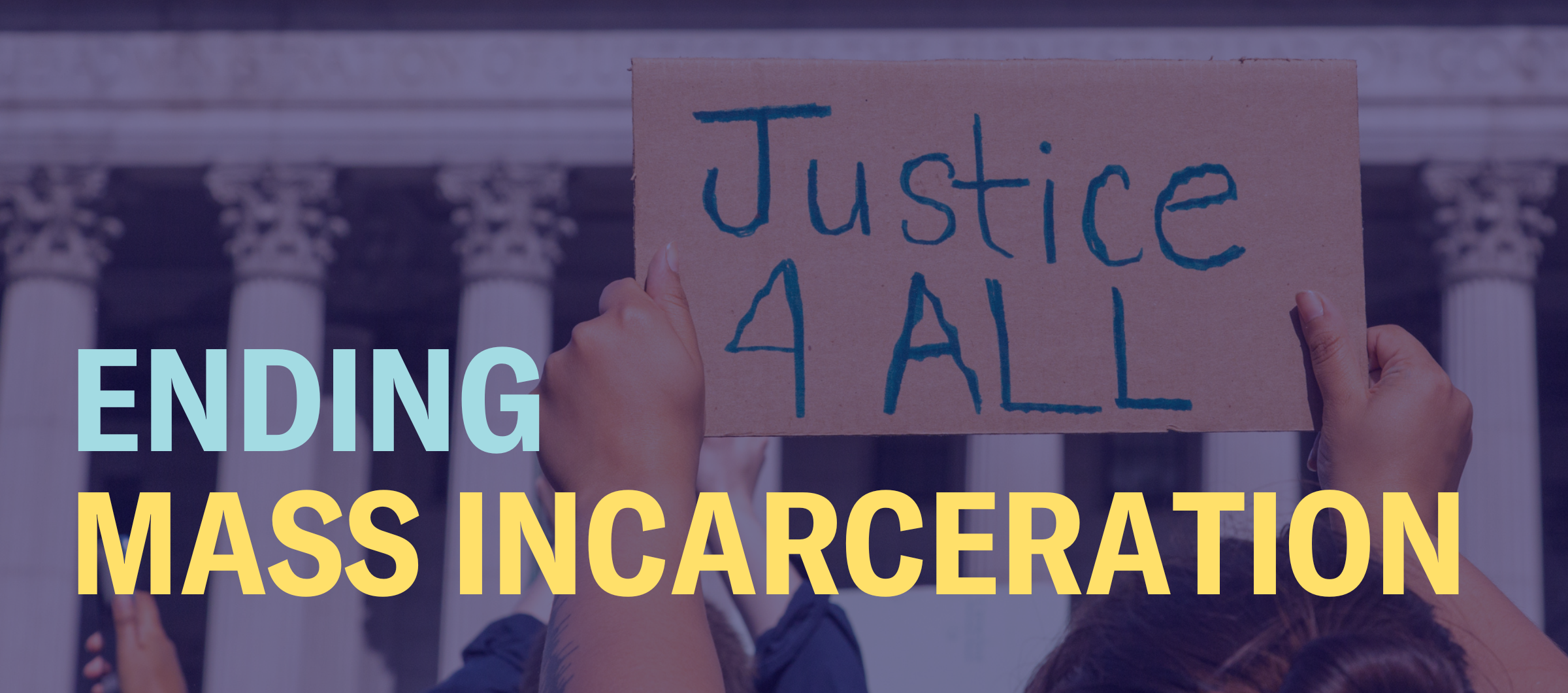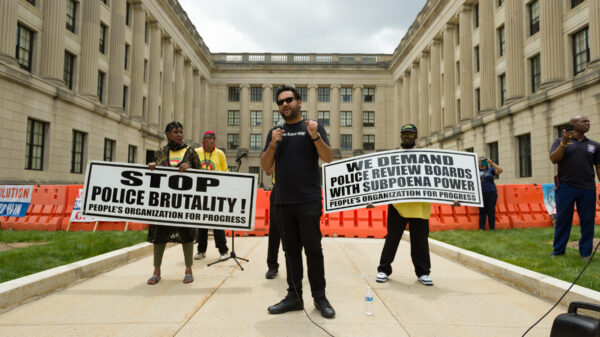

Pursuing the End of Mass Incarceration in New Jersey
Get Involved
By completing this form, I agree to receive occasional emails per the terms of the ACLU’s privacy statement.
Last updated on August 06, 2025
Pursuing the End of Mass Incarceration in New Jersey
How decarceration can embody liberty and justice for all.
The carceral system and the crisis of mass incarceration has devastated families, harmed communities, and deepened racial inequities in the criminal legal system and throughout the nation. The ACLU of New Jersey has dedicated decades working toward reducing the number of people in state prisons and jails by advocating for more releases and fewer incarcerations. Because New Jersey has the highest rate of racial disparities in its prison population in the country, decarceration is fundamental to racial justice here, and beyond.
The ACLU-NJ has achieved enormous strides toward decarceration within our state through victories in the courtroom and in the Legislature that contributed to New Jersey’s historic reduction in its prison population by more than 50 percent since 2011. But there is more to be done to begin to repair the harms of mass incarceration.
We’ve made important progress improving conditions within New Jersey prisons – ensuring young people who are incarcerated can access their legal right to a free public education and securing groundbreaking policy changes in how the state prison system recognizes and protects transgender, intersex, and non-binary people in custody – but we know the best relief from oppressive conditions is release.
In this pivotal moment, New Jersey can expand on its proven foundation that was built on implementing bail reform, restricting the use of solitary confinement, and overhauling youth sentencing. Data shows that early releases during COVID-19, elimination of cash bail that ensured most people can remain at home while awaiting trial, and other criminal legal reforms have not caused an increase in violent crimes or repeat offenses.
History has shown that tough-on-crime policies don’t work. From the failed drug war to the 1994 federal crime bill, policies rooted in fear and racism devastated communities of color and gained the U.S. notoriety for having the highest rate of incarceration and the largest prison population in the world.
To truly improve public safety, we must prioritize social and racial justice – and that begins with adopting non-punitive alternatives to incarceration that expand access to opportunity and resources. We must implement data and research-informed approaches that are developed in collaboration with the communities that are impacted most.
Providing a national model for pretrial detention by eliminating cash bail
In 2014, New Jersey passed the Criminal Justice Reform Act, a bipartisan piece of legislation that was implemented in January 2017 to overhaul bail in our state, mandating a presumption of release for almost all defendants and equipping judges with more data to inform their pretrial release decision-making. This achievement reflected overwhelming support from the public and the collaboration of a wide array of stakeholders under Governor Chris Christie.
Soon after, opponents in the bail bond industry tried to halt the law in court. We partnered with impacted community members to share their stories, educated the public, and appeared in Federal Court to ensure that bail reform could continue as a necessary change in fairness – all as a part of a longer decarceration movement that we’re still fighting for today.
Since the law went into effect, data shows that bail reform worked: the pretrial jail population is down without any meaningful increase in serious crimes, people are showing up in court at higher rates than ever before, and the recidivism rate for serious, violent crime is at only one percent. And there are now thousands of people who kept jobs, stayed connected with family, and maintained their housing because they were not incarcerated waiting for their case to be heard.
We must address public safety concerns with data-driven solutions instead of reactive policies based on fear, which will only serve to further harm Black and brown communities and reverse the progress we have made.
Building a foundation for decarceration with Public Health Emergency Credits
When the pandemic wreaked havoc on prisons and jails, New Jersey quickly amassed the shameful distinction of having the highest COVID-19 death rate among incarcerated people across the nation. In an urgent effort to save lives, the ACLU-NJ shared its vision with legislators for a first-of-its-kind law: the Public Health Emergency Credit (PHEC) law. Under PHEC and related ACLU-NJ litigation, nearly 9,000 people were released early from their sentences. That’s about 5,000 years – or more than two million days – of returned freedom and opportunity.
PHEC was passed for a specific reason – to address the crisis of a highly contagious pandemic. But the law has taken important steps to confront a much longer crisis: over-incarceration and the criminalization of people of color. Early releases under PHEC were the floor – we want the ceiling. We know PHEC can serve as a model for change because the data supports it: after PHEC, recidivism rates for released individuals were not significantly higher than the state average.
At its heart, PHEC is not a pandemic policy. It’s a policy about humanity. It’s a policy recognizing that no one, including incarcerated people and their families, deserves gratuitous suffering. But that was true long before the first case of COVID-19, and it’s true for the daily injustices of over-incarceration that will exist long after the last public health emergency of the pandemic is over.
Restricting the use of solitary confinement
Incarceration within the confines and conditions of the historical prison system actively harms incarcerated people. Although the ACLU-NJ has achieved significant wins – with legislation and litigation – regarding prison conditions, the reality of incarceration remains deeply violent and dehumanizing.
The ACLU-NJ and our coalition partners worked for the passage of the Isolated Confinement Restriction Act, which limits use of solitary confinement to no more than 20 consecutive days or longer than 30 days during a 60-day period and prohibits any use of solitary confinement for certain vulnerable populations.
Advancing youth justice by ensuring no child spends life in prison
No child should be forced to spend their entire life in prison – a life sentence, or any functional equivalent, is unconstitutional.
In 2003, James Comer received a sentence of 75 years in prison, with more than 68 years without parole, for his role in four robberies and a felony murder when he was 17 years old. Relying on cases from the United States Supreme Court that prohibited sentences of life without parole for children, the ACLU-NJ filed a motion to correct this illegal sentence on his behalf in 2014. Mr. Comer is now scheduled for release by 2025, and the resulting court opinion has made it possible for nearly 100 young people in New Jersey to petition for early release.
Fighting for change by prioritizing racial and social justice
Harmful backlash to criminal legal system reform is one we recognize – pushing back against fearmongering peddled by politicians is essential to advance racial and social justice for generations to come.
We must not allow those who profit from keeping people in prison to drive policies that continue to harm families, communities, and incarcerated people. Inaction will cost lives, force families to be torn apart, and hold communities back socially and economically.
We must reclaim our vision for a just and equitable New Jersey – one that prioritizes racial justice, centers the voices of those who have historically not been protected by our systems and institutions, and leads the nation in protecting and expanding civil rights. We must not let fear or self-serving political motivation lead us to repeat a harmful history of criminalization that will fuel over-policing and mass incarceration.
Instead, to truly improve public safety, lawmakers must prioritize social and racial justice by:
- Implementing categorical clemency
- Ending mandatory minimums
- Expanding compassionate release
- Removing barriers to employment and housing for formerly incarcerated people
- Decriminalizing all drugs

